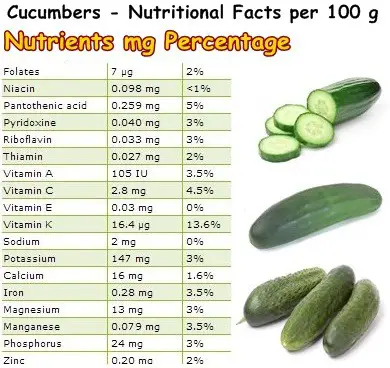The health benefits of cucumbers
Cucumbers are native to many regions in the world due to their ability to thrive in both temperate and tropical climates. However, it is believed that they originated in Western Asia or the Middle East around 2500 BC.
The worlds largest producer of cucumbers is China, followed by Iran, Egypt, Russia, Turkey, Mexico, Spain and Japan, to name but a few. Collectively their annual production of cucumbers is estimated to be around 68 million tons.
Cucumbers belong to the same family as Melons and squashes, and are technically a fruit, but are commonly considered a vegetable. Commercially there are two types of cucumbers, although many hundreds of varieties, the larger, longer ones with slightly thicker skins are known as slicing cucumbers and are meant for fresh consumption. Then there is the smaller type, with thinner skins, these are used for pickling.
The three main phytonutrients found in cucumbers are cucurbitacins, ligans and flavonoids and these make them an ideal choice for maximising your anti-cancer, anti-inflammatory and antioxidant benefits.
Cucumbers have three types of ligans, these are lariciresinol, pinoresinol and secoisolaricresinol. In studies these ligans have been strongly associated with a reduction in cardiovascular disease and cancer, including breast, ovarian, prostate and uterine. This research has been so successful it has got the attention of the pharmaceutical industry who are now studying the effects of this multi-factorial compound.
Cucumbers are a rich source of triterpene phytonutrients called cucurbitacins. Research has shown that cancer cell development and survival can be blocked by the activity of cucurbitacins. Due it's effectiveness in research trials there is suggestion that cucurbitacins may possibly be a future anti-cancer drug.
The antioxidants found in cucumber support the liver to neutralise free radicals and the high levels of vitamin K, fiber and water content can also assist the liver to detoxify and therefore can support the functioning of a healthy liver.
Cucumbers are a great choice during the hot summer months, with a naturally purified water content of 96% cucumbers are the obvious choice for nutritious hydration, and with their natural diuretic effect cucumbers can help you eliminate unwanted fluid retention.
Interestingly there is more nutrient richness in the skin and seeds of a cucumber than that found in the flesh. Ideally choose organic cucumbers as these will have no harmful pesticide residues left within the wax coating applied to the skin. It is always advisable whether you buy organic or not to gently wash the cucumber under cold water giving the skin a gently scrub to remove the wax coating applied for preservation.
Nutrients found in cucumbers
A closer look at some of the nutrients and their benefits to your health.
Vitamin k
- Promotes normal healthy clotting
- Prevent heart disease and arterial calcification
- Improves vascular health, leading to fewer varicose veins
- Maintains healthy bones
- Acts as an adjunct to vitamin D
- Helps to reduce the risk of developing prostate cancer, lung cancer, liver cancer and leukaemia
Pantothenic acid - Vitamin B5
- Helps to alleviate respiratory conditions
- Reduces stress and anxiety
- Promotes a healthy functioning immune system
- Helps to prevent hair loss
- Aids in the metabolism of lipids and carbohydrates
- Helps to regulate cholesterol levels
- Supports a healthy nervous system
- Promotes a healthy functioning liver
- Helps to reduce inflammation, dryness and pain in the eyes
Vitamin C
- Supports the immune system
- Increases iron absorption
- Protects cells from oxidating damage
- Helps reduce the risk of heart disease, including coronary heart disease and stroke
- Helps in the formation of collagen, carnitine and catecholemines
- Helps prevent and fight cancer
Vitamin A
- Maintains normal skin function
- Maintains healthy vision
- Promotes a healthy functioning immune system
- Maintains a healthy neurological function
- Reduces inflammation through fighting free radical damage
Manganese - Mineral
- Supports the formation of healthy bones through absorption of calcium
- Supports collagen production
- Helps with the control of blood sugar
- Contributes to the prevention of oxygen related damage and damage from ultraviolet (UV) light
- Antioxidant, fights free radical damage. Diets low in manganese have been linked to skin problems and asthma
- Proper functioning of the thyroid gland
- Promotes metabolism of fats and carbohydrates
Pyridoxine - Vitamin B6
- Protects the immune system
- Maintains a healthy metabolism
- Helps to produce energy from food
- Promotes healthy hormones
- Maintains healthy cells
- Assists in the absorption of vitamin B12
- Improves neurological function
- Promotes healthy brain function
- Reduces premenstrual symptoms
- Helps to prevent arteriosclerosis and heart disease.
Iron - Mineral
- Essential for the formation in of blood cells
- Supports healthy muscle function
- Helps in brain development
- Helps to regulate body temperature
- Supports a healthy neurological function
- Oxygen carrier to from one cell to another.
Riboflavin - Vitamin B2
- Helps to produce energy from food
- Antioxidant
- Helps to metabolise fats and protein
- Assists in the proper functioning of the nervous system
- Helps to synthesise vitamins B6 and folate
- Improves eye health
Potassium - Mineral
- Supports a healthy nervous system
- Helps maintain a healthy blood pressure
- Maintains a healthy kidney function
- Regulates fluid balance
- Lowers the risk of cardiovascular disease
- Helps to improve bone and muscle health
- Helps to reduce anxiety







 Organically Pure
Organically Pure 
 Reply With Quote
Reply With Quote